CyberGhost Review 2025
A first-class VPN solution with a charming user interface.
CyberGhost has a pleasant user interface, a wide range of functions and a good security record. Thanks to Smart Rules, it may be the most customizable VPN service.
- Table of Contents
- CyberGhost Review Overview
- CyberGhost: Latest News and Updates
- CyberGhost Background & History
- CyberGhost Features
- CyberGhost Cost: Plans & Value for Money
- Apps & Support
- Servers & Server Locations
- Speeds & Performance Testing
- Streaming & Torrenting
- CyberGhost Security: Encryption & Protocols
- Privacy & Logs
- Customer Support & Service
- Ease of Use
- Bottom Line: Do I Recommend CyberGhost?
- CyberGhost Alternatives
CyberGhost has a user-friendly interface with solid security and features you can fine-tune however you like. Try it out for free with a 45-day money-back guarantee.
Welcome to PrivacyJournal’s CyberGhost review. Today, I’ll be your guide to one of the more enigmatic VPNs in the business.
CyberGhost is one of five or so VPNs that routinely compete for the top spot on any list. You know the usual suspects: NordVPN, Surfshark, ExpressVPN, Windscribe, Private Internet Access…
Compared to all of those, CyberGhost has always felt a little quirkier — controversial, even. It’s affordable and powerful, but a lot of people wouldn’t be caught dead using it. It’s committed to cyber security, but its parent company is best known for malicious adware.
- Best CyberGhost alternative
So what’s the truth? Is CyberGhost a sleeper contestant for the top of the VPN heap, or do dark secrets threaten to bring it down? My CyberGhost VPN review has all the answers.
Is CyberGhost good for torrenting?
CyberGhost allows torrenting and has torrent-optimized servers. However, the lack of obfuscation might pose a risk for P2P file sharers.Is CyberGhost better than NordVPN?
The two perform similarly, though NordVPN is light-years ahead where it counts: security and privacy.Can CyberGhost be traced?
Not by unauthorized third parties. CyberGhost VPN uses strong encryption and communication protocols. The security risk comes from its parent company, and anybody that company might communicate with.Does CyberGhost work in China?
Yes, CyberGhost works in China, and I listed it as one of the best China VPN options. However, it doesn’t have any obfuscation security features, which can make it a worse choice for use under repressive governments like China, compared to other VPN providers.
CyberGhost Review Overview
| Website | |
| Pricing | $2.29 per month for a 3-year-3-month plan ($87.75 for three years and three months) |
| Free trial available | 1 Day on desktop, 7-days on mobile |
| Money-Back Guarantee | 45 Days |
| Desktop OSes | Windows, MacOS, Linux, Amazon Fire Stick, Router, Raspberry Pi, Synology NAS, VU+ Solo 2, Chrome OS |
| Mobile OSes | Android, iOS |
| Worldwide Server Amount | 7,300 Servers worldwide |
| Simultaneous Connections | 7 |
| Streaming Access | Netflix, BBC iPlayer, Hulu, Disney+ |
- Extremely fast speeds
- Affordable long-term plans
- User-friendly interface
- Large server network
- Advanced features: kill switch, split tunneling, NoSpy servers
- Parent company raises security concerns
- Can’t unblock all streaming platforms
- VPN protocols too dependent on your OS
- Overly complicated knowledgebase
How Good Is CyberGhost?
CyberGhost is definitely fast. It’s also easy to use, and if you subscribe for a year or more at a time, it’s wildly cheap. But there are just too many questions about its security and reliability for me to recommend it over top performers like NordVPN.
CyberGhost: Latest News and Updates
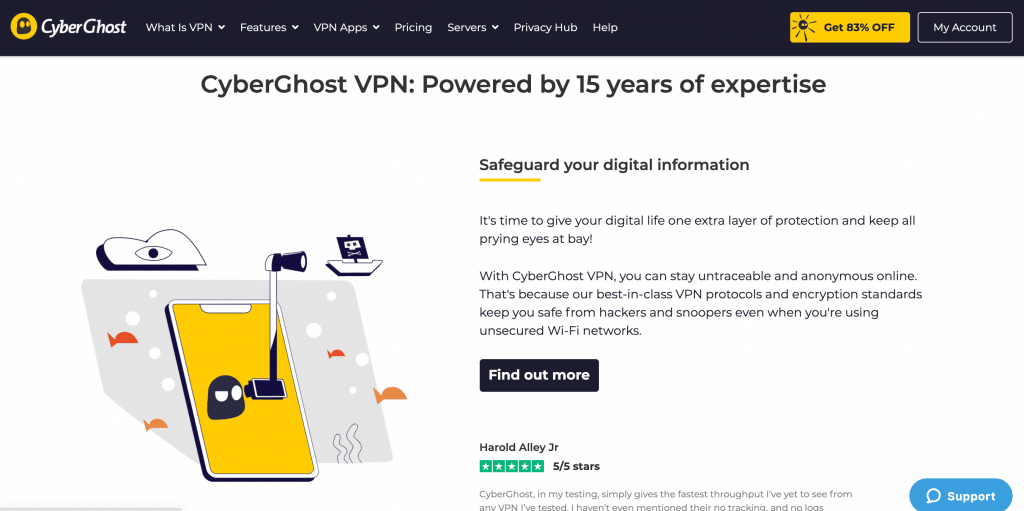
In this section, I’ll update you whenever CyberGhost does anything newsworthy. Things have been quiet recently. The biggest development of the last year has been CyberGhost’s increasing support for the cutting-edge WireGuard protocol.
CyberGhost Background & History
What Is CyberGhost?
CyberGhost is a virtual private network (VPN) that you can use to disguise your IP address and activity on the internet. Its network has grown to include just under 7,300 servers across 91 countries since 2004.
As with any VPN, you can use it to stay anonymous online, protect yourself from hackers, watch streaming content in other countries and a host of other benefits.
CyberGhost arguably has the most metal name of any VPN on the market, though Surfshark and TunnelBear give it a run for its money.
Who Owns CyberGhost?
I’m going to pay more attention to this section than I normally do, since CyberGhost’s parent company is the source of a lot of its woes.
CyberGhost has been available as a product since 2004, but it was first established as a company in Romania in 2011 by German entrepreneur Robert Knapp. In 2017, it was acquired by Kape Technologies, which claims to be “an online distribution and digital product hub,” a statement about as meaningful as George Costanza describing himself as an “importer/exporter.”
As it turns out, Kape has good reason to be vague. “Kape Technologies” is the rebrand of CrossRider, an ad-injection firm familiar to Mac users as the author of those MacKeeper ads that yelled at you in 2018. Its methods were so incredibly shifty that even Google told them to settle down.
To be fairer to Kape than it probably deserves, there’s no evidence that Crossrider was intentionally developed as a malware vector. But even if it wasn’t, the company still created a malware platform it failed to control or own up to. That’s a hard qualifier on its ability to ensure VPN services are keeping you safe.
In a blog post announcing the 2017 acquisition, Knapp acknowledged the dodgy past of Kape/Crossrider. He claimed the parent company had turned over a new leaf and would not impact CyberGhost operations in any way.
Although CrossRider adware was infecting computers as recently as 2019, I couldn’t discover any evidence that linked those infections to the parent company. The attacks could be the work of former customers from back when Kape was evil. I also couldn’t find direct evidence against Knapp’s claim that Kape doesn’t interfere with CyberGhost.
But that doesn’t mean the evidence doesn’t exist. Ultimately, only you can decide whether to trust CyberGhost or if the CrossRider link is a dealbreaker. My job is to give you all the information, not to make your decisions.
Where Is CyberGhost Located?
CyberGhost is headquartered in Romania, where it was founded. Romania is forward-thinking on data privacy, having added protections on top of the EU’s already strong General Data Protection Regulation (GDPR). It’s also outside the 14 Eyes intelligence-sharing network.
Kape Technologies, CyberGhost’s parent company, is based in the UK. The Data Protection Act of 2018, which implements GDPR in the UK, is still in effect following Brexit. That’s the good news. The bad news is that the UK is one of the original Five Eyes nations. If the U.S. asks them for online activity logs, the UK has to comply.
Again, whether this matters comes down to how much you’re willing to trust Robert Knapp that Kape doesn’t run CyberGhost.
How Safe Is CyberGhost?
Looked at in a vacuum, CyberGhost ticks all the VPN safety boxes. It only supports OpenVPN, WireGuard and IKEv2, the three safest security protocols available. All three use AES-256 encryption, which can’t be cracked without a key (at least in this universe’s lifetime). It’s never suffered a major security breach.
Yet you can’t keep CyberGhost in a vacuum. I’m going to start sounding like a broken record here, but any use of their VPN service runs the risk — small but present — of interference from its creepy parent company.
How Has CyberGhost Changed Over Time?
There’s not much to say about CyberGhost’s history outside of the acquisition. Appropriately enough for a VPN provider, it’s a bit under the radar online, lacking even an English Wikipedia page. The only important dates are 2011, when CyberGhost was founded in Romania, and 2017, when it was sold to Kape Technologies.
CyberGhost Features
Features List:
- Automatic kill switch
- Split tunneling
- Optimized servers for streaming, torrenting, gaming
- NoSpy servers
- Dedicated IP address option
- Ad blocker
- Smart Rules customization
CyberGhost’s features are as mixed a bag as…well, as everything else about CyberGhost. Some of them are awesome. Some of them barely work. And if you’re on the wrong device, you’ll never see some of them at all.
Basic Features
A VPN is a lot like a car. Before you check out the all-wheel drive and sweet sound system, you should make sure it has wheels and a gas tank.
CyberGhost has everything a VPN needs to deliver at the baseline level. There’s a wide selection of servers you can toggle between to mask your IP address, and a few protocols that all offer strong encryption. It also has an automatic kill switch, which protects you if your connection drops. Nothing major is missing.
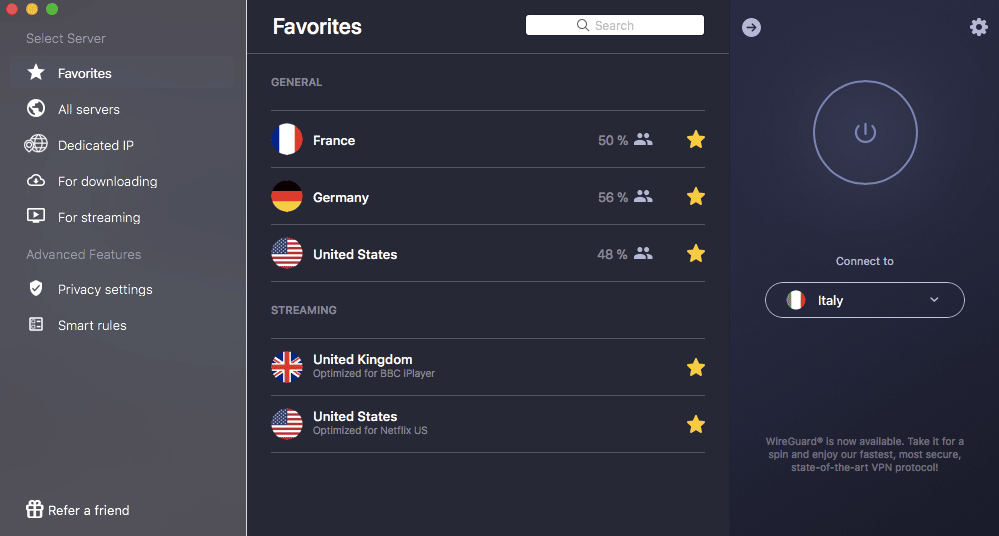
CyberGhost has a wide variety of server types available. There are two general approaches to managing a VPN server map: either you optimize all the servers as best you can for every task, or you specialize. CyberGhost VPN comes down hard on the latter end.
Some servers are built for download speed. Some are built for streaming. It was a nice surprise to see streaming services from multiple countries getting attention — I’m not sure what kind of content is on Sweden’s C More Entertainment platform, but I bet it’s wild.
Depending on your OS, you might also get servers optimized for gaming or torrenting (though they all allow torrenting).
Advanced Features
A couple of CyberGhost’s features require some unpacking. One caveat: beyond here, it matters what OS and version you’re running on. If you don’t see one or more of these offered on your CyberGhost free trial, you might be using an incompatible version of the app.
NoSpy servers are CyberGhost VPN servers located in Romania, which enjoy the extra protection of that country’s tough data privacy laws.
Dedicated IP is a feature for anybody who might be nervous about sharing an IP address with thousands of other users. For a small extra fee, CyberGhost will give you your own private IP address. This ensures you won’t get booted from any of your favorite websites due to your fellow users’ antisocial antics.
Split tunneling lets you designate websites and apps that can safely run outside the VPN. If you know a certain site won’t transmit any personal data, you can bypass the VPN so that it runs faster.
Finally, there’s the ad blocker, which you can turn on via the “privacy settings” page.
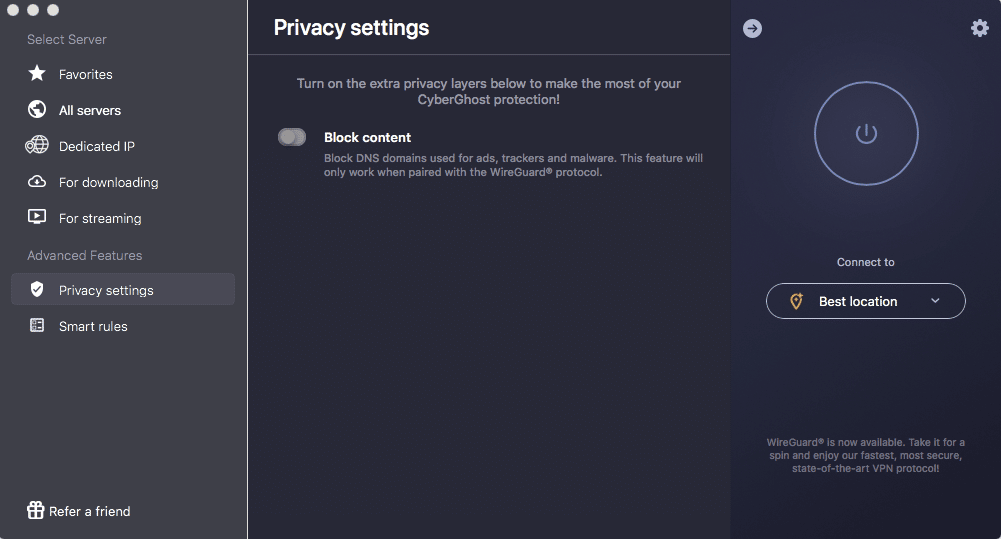
A word about that. The CyberGhost ad blocker is unusual. Instead of preventing you from accessing websites that leave you vulnerable to intrusive advertising, phishing and malware, this ad blocker replaces what you see on those websites with a CyberGhost-branded warning.
To do that, CyberGhost inserts its own code into the hostile website, effectively hacking the hackers. It’s a problematic approach. Leaving aside the moral debate about fighting fire with fire, the practical consequence is that the CyberGhost VPN ad blocker doesn’t work on HTTPS websites. In the end, it’s only sporadically effective.
What Is the Smart Rules Feature?
Smart Rules is a feature you can use to program CyberGhost with certain behaviors. Many VPN providers let you toggle whether the VPN app launches as soon as you log on, or whether it automatically connects on unknown WiFi networks.
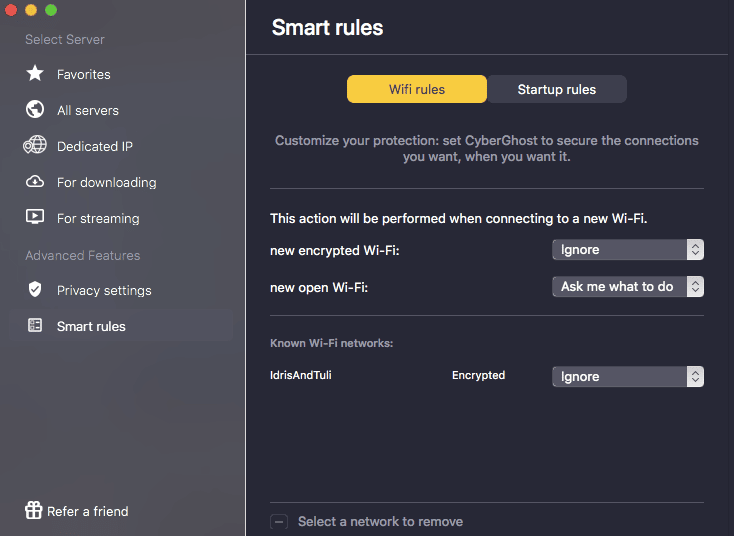
CyberGhost takes that concept to the next level. You can automate every single thing about this VPN: when it connects, where it connects, when it sends you messages. It’s an incredible breath of fresh air in an industry that’s often too ready to oversimplify.
CyberGhost Cost: Plans & Value for Money
CyberGhost has one of the widest pricing swings of any VPN. At the monthly level, it’s as expensive as NordVPN. If you sign up for 25 months at a time, however, it’s as cheap as Private Internet Access.
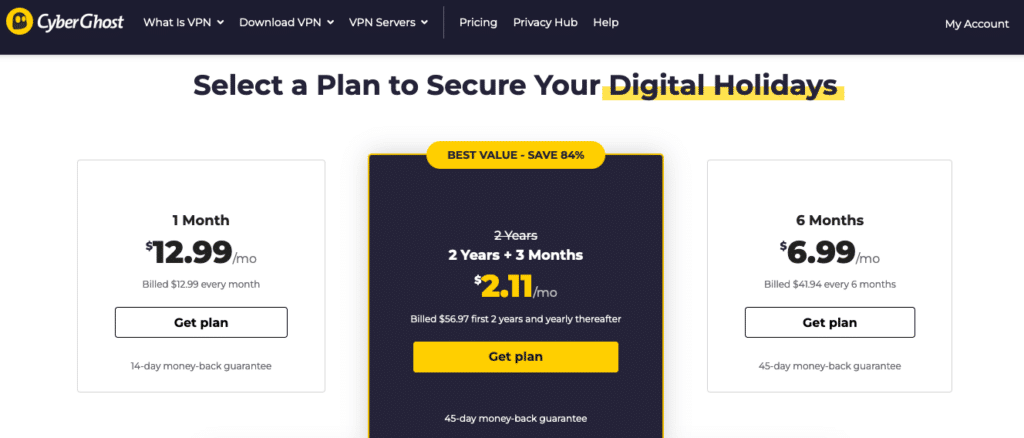
The two-year plan is very good, though not quite as good as Surfshark’s subscription for the same length of time. Each subscription allows for up to seven devices to be connected simultaneously.
CyberGhost Free vs Paid
CyberGhost is one of the few top VPNs to offer an actual free trial instead of a money-back grace period. It’s only 24 hours long, but that’s 24 hours more than you get with the others. On mobile, it’s a full seven days.
There’s no forever free plan, but there is a 45-day money-back guarantee, longer than almost every other VPN. However, if you go with the one-month plan, you only get 14 days.
Your payment options are a credit or bank card, PayPal, Amazon Pay or bitcoin (the only anonymous option).
Apps & Support
CyberGhost offers desktop apps for Windows, MacOS and Linux. On mobile, it supports iOS and Android devices. Browser extensions are available for Chrome and Firefox.
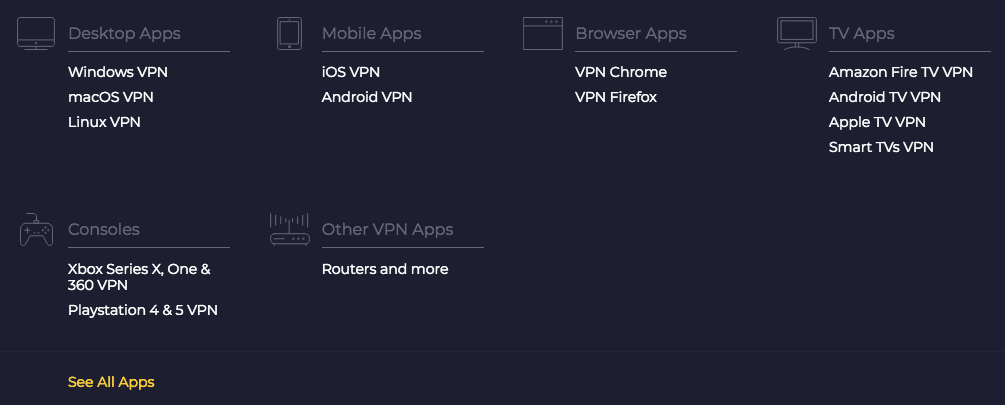
Seven TV options are supported: Amazon Fire TV, Android TV, Apple TV, Samsung Smart TV, LG Smart TV, Google Chromecast and Roku.
CyberGhost VPN can protect game consoles, but not directly. You’ve got three options for an Xbox or Playstation: install the VPN on your router, use it to change your DNS settings on the console, or route your connection through your protected PC. All three paths take a few steps, but the CyberGhost help center holds your hand through the process.
Speaking of routers, CyberGhost can be installed on all routers compatible with OpenVPN; however, this doesn’t include most routers provided by your ISP. Luckily, CyberGhost’s website has a list of routers that can be configured for a VPN.
Servers & Server Locations
CyberGhost has more than 8,900 servers in its network, across 114 locations in 91 countries and territories. By the time you read this, the total number of servers could have changed. I had to revise it twice while writing this review.
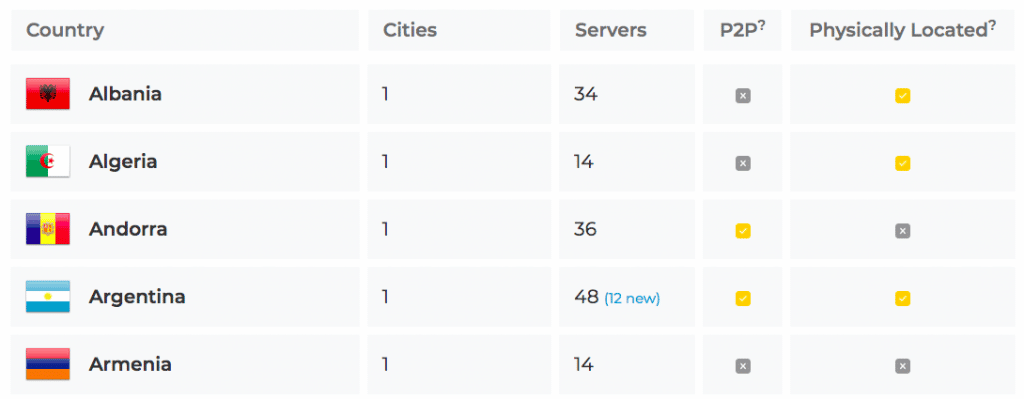
It’s clear that CyberGhost has one of the largest and fastest-growing server networks in the premium VPN world. But not all of those servers are physical locations. Many, especially in more remote spots, are virtual servers.
That’s not necessarily a bad thing. A VPN provider might sometimes use virtual servers to pad its network for advertising purposes, but it’s also fundamentally harder to set up brick-and-mortar data centers in some locations. Without virtual servers, places like Belarus and Malaysia would have far less VPN service overall.
CyberGhost: No Server Available
At times, you might try connecting to the CyberGhost network, only to be told there’s “no server available.”
According to CyberGhost support, these dreaded 505 errors happen because the company can’t guarantee that any server location will be permanent. Some servers are virtual, and therefore more ephemeral. Sometimes servers break, or get broken into, or there’s an earthquake or something.
Sadly, a VPN server — even a rented virtual server — is merely metal and plastic. It’s vulnerable to all sorts of issues. Although CyberGhost’s network is in a state of flux, that’s hardly unique to this service.
Speeds & Performance Testing
After security and privacy, speed test performance is the metric I judge a VPN most harshly on. A VPN may be a common-sense safety measure, like a seat belt, but it still has to be convenient. You can bet that fewer drivers would wear seat belts if they were made out of chain-link.
Three numbers define internet speed. Latency is the length of a “ping,” the amount of time it takes a packet of data to get from a server to your computer, measured in milliseconds (ms). Download speed is the megabytes of data per second (Mbps) that can move from a web server to your computer. Upload speed measures the Mbps that can go the other way.
To measure CyberGhost’s speed, I started with my non-VPN speed as a control. Then I tested five CyberGhost VPN servers, moving farther from home each time. Here are my speed test results:
| Location: | Latency (ms) | Download speed (Mbps) | Upload speed (Mbps) |
|---|---|---|---|
| Portland, Oregon (unprotected) | 20 | 31.46 | 5.93 |
| Seattle, Washington (fastest server) | 25 | 26.63 | 5.65 |
| Washington, D.C. | 169 | 19.72 | 5.49 |
| Paris, France | 311 | 28.82 | 5.56 |
| Cairo, Egypt | 391 | 15.15 | 5.48 |
| Jakarta, Indonesia | 351 | 19.70 | 5.52 |
These speed tests show excellent numbers. Upload speed was incredibly consistent, making CyberGhost a great choice for voice calls and video chats. Latency follows a fairly standard arc for VPN services. It shoots up the farther you get from home, but no more than I expected.
What really impressed me, though, was download speed. I’m not sure if it’s CyberGhost’s implementation of WireGuard, its servers being relatively unburdened or another trick, but they’re clearly doing something right. Download speeds from Jakarta — the other side of the world from me — clocked in at two-thirds that of my unprotected connection.
Streaming & Torrenting
CyberGhost VPN boasts the kind of download speed that makes for excellent streaming and torrenting. It not only allows both, but has servers optimized for each one.
But there are two sides to the VPN streaming story. Speed is one thing, but you need to be able to get onto the streaming platform in the first place, in a world where most of them try to block VPNs for fear of copyright issues.
Can CyberGhost Unblock Netflix and Other Streaming Sites?
CyberGhost VPN managed to unblock Netflix, Amazon Prime Video, Disney+ and BBC iPlayer (with a UK domain). CyberGhost VPN was not able to unblock HBO Max or Hulu, where it suffered a bizarre domain error.
Four out of six ain’t bad, but it’s not great. CyberGhost needs to try harder to get around these blocks, especially when its competitors are hitting all six.
CyberGhost Security: Encryption & Protocols
CyberGhost’s security is mostly good. Not only am I satisfied with its protocols and encryption options, but this area is also unaffected by CyberGhost’s relationship with Kape Technologies. Privacy is another matter, but I’ll leave that until the next section.
CyberGhost offers the only three protocols I think any VPN should support. OpenVPN is the open-source old guard, fast and reliable. WireGuard is faster and slimmer, but untested. IKEv2 is the fastest of all, best for mobile connections. All three came out clean in a leak test.
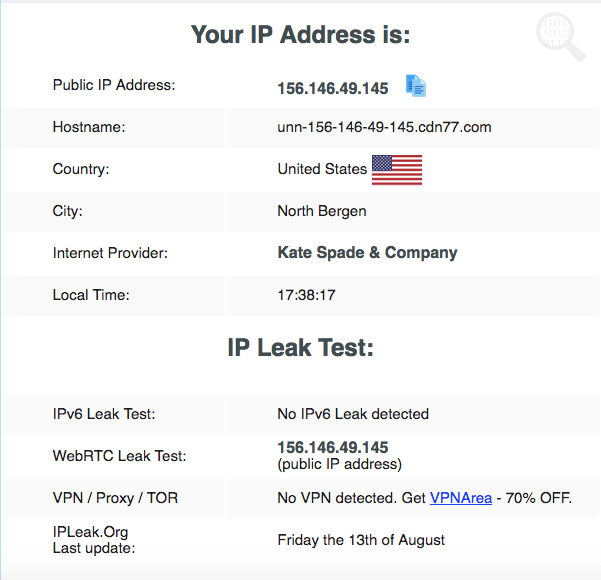
Why “mostly” good? Because CyberGhost heavily restricts your security protocol choices based on your OS. Several platforms only have access to one protocol at any given time.
There’s no native support for OpenVPN, which I still consider the superior VPN protocol. WireGuard may be the sexier open-source protocol, but OpenVPN has been around for longer, meaning there’s been more time for any flaws to come to light. Few of them have.
You can use OpenVPN through CyberGhost’s desktop apps on Windows, but you have to jump through a lot of arduous setup hoops. On macOS, it’s not available at all.
IKEv2 also has issues on CyberGhost VPN apps. It’s the fastest protocol for mobile connections, yet CyberGhost doesn’t support it on Android. But it does support it on Windows and macOS, where OpenVPN and WireGuard are almost always faster. I’m a bit flummoxed by the decision-making here.
At least there’s nothing wrong with the VPN encryption. All CyberGhost protocols use strong 256-bit security, either through AES-256 (OpenVPN, IKEv2) or ChaCha20 (WireGuard).
One other worrisome security issue is the lack of obfuscation. Obfuscation means hiding not just your IP address, but the fact that you’re using a VPN at all. It’s important in countries like China and Turkey where VPN use is banned. CyberGhost doesn’t have any obfuscation measures, which makes it a poor VPN for China and other repressive governments.
Privacy & Logs
Hoo boy. Buckle up.
CyberGhost’s privacy policy opens with a sort of executive summary, describing an idealized version of how its VPN respects your privacy. So, does CyberGhost keep logs? To summarize the summary: no browsing history logs, no connection of your account to your activity in the VPN, no data saved at all except your IP address and session time.
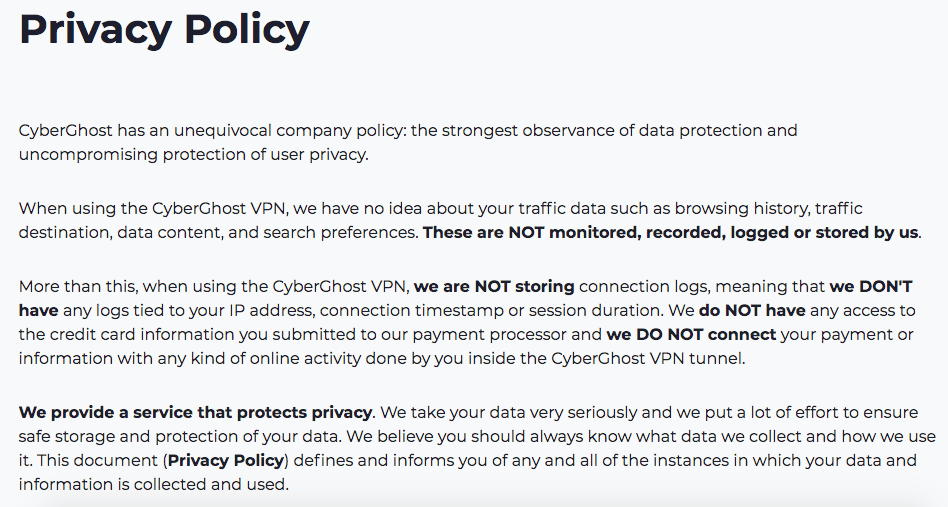
So far, CyberGhost is saying all the right things. The problem is that they only apply to the VPN, not the parent company, Kape Technologies.
In case you skipped to this section, Kape used to be CrossRider, a company that used the internet for what I would describe as “legal organized crime.” There’s no evidence that it still peddles malware, but also no evidence that it’s stopped.
But as long as the VPN really doesn’t save user data, why should it matter what Kape is up to? CyberGhost can’t provide logs to its parent company if those logs don’t exist, right?
Not exactly. Even if the privacy policy is completely honest (a big if), I still have a few concerns.
Concern #1: Upon signing up for the service, CyberGhost collects a lot more personal data than seems necessary. You have to provide your name, address, email address, username and payment information, plus your IP address and country of residence. Plenty of VPNs manage fine with just an email.
Concern #2: Farther down in the privacy policy, CyberGhost claims the right to “disclose your personal data to any member of our group of companies” including “our ultimate holding company,” i.e. Kape Technologies.
If you’ve been following along, CyberGhost knows your name, where you live and your IP address, and can freely provide that data to a company famous for intrusive malware. We’re not done, either.
Concern #3: CyberGhost has not been reviewed by an independent auditor since 2012, long before the Kape acquisition. The company keeps claiming that they plan to get a third-party audit, but as far as I can tell, it hasn’t happened yet.
Concern #4: CyberGhost is located in Romania, a great country for data privacy, but Kape is based in the UK. As I covered above, the UK is a 14 Eyes nation, bound to share intelligence with every other member state.
Putting it all together, it’s extremely easy to envision a scenario where the United States Department of Justice could buy your IP address from Kape because the attorney general doesn’t like the political stances on your blog.
I freely admit that all this evidence is circumstantial. My opinion, however, is that CyberGhost isn’t serious enough about the vulnerabilities created by its parent company. And yes: anytime you use a VPN, you’re taking some things on faith. But CrossRider/Kape raises concerns that I just don’t have about NordVPN, Surfshark or Windscribe.
Customer Support & Service
Normally in these VPN reviews, I make some kind of basic error usually due to a lack of coffee, which gives me a chance for some firsthand experience with customer support. I didn’t screw up CyberGhost, though, so I explored its customer service from the outside.
There are two places to access help from the CyberGhost app: right from the “preferences” menu, and by clicking the “knowledgebase” button under the “general” tab. The knowledgebase is a massive collection of articles grouped into the broad categories of guides, troubleshooting, FAQs and announcements (mostly empty).
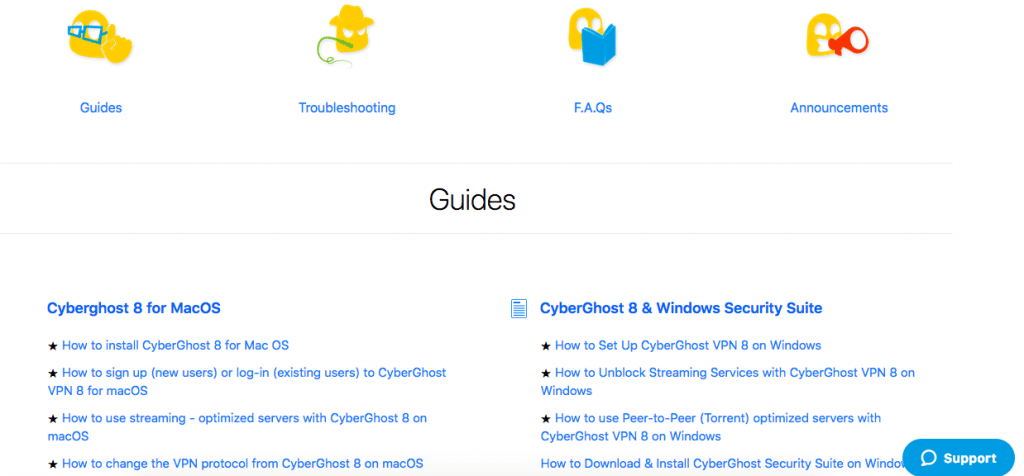
The articles are extensive, and nearly every possible issue is covered. There are opportunities for clearer writing and better editing, but not so many that it becomes unreadable.
However, the quality of the advice itself is uneven. Some articles are laid out in user-friendly fashion with screenshots, while others are confusing. For example, the advice offered if you can’t connect to the VPN on Windows is to go into your command module. Before you’ve rebooted your computer. See what I mean?
If the knowledgebase isn’t working for you, there are two other options. You can start a Zendesk-powered live chat using the blue “support” button at the bottom right, or you can send an email.
Live chat is great — quick and helpful. On the other hand, sending a longer message is harder than it needs to be. The support ticket page is a dizzying tower of text boxes, most of which will be unintelligible to the average user. Only three of them are mandatory.
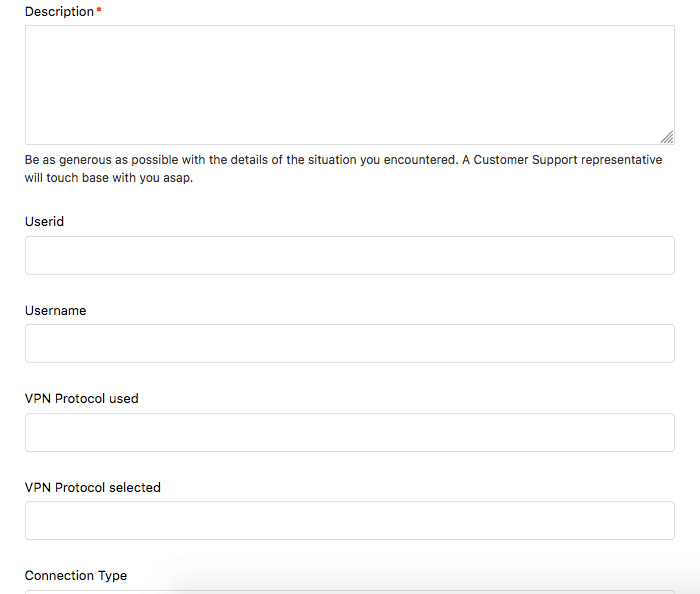
It’s rare that I get after a VPN for offering too much customer support, but I really think CyberGhost needs to pare down and standardize its help articles and support ticket form. That could turn this into one of the better help desks I’ve seen recently.
Ease of Use
Other than the speeds and the Smart Rules, user experience is the best thing about CyberGhost. Most VPNs see UX as a choice between friendliness and depth. CyberGhost is one of the few that manages to balance both sides.

CyberGhost’s desktop app starts as a menu/taskbar icon, but can be popped out as its own window with one click. The black and gold color scheme gives the whole thing a smooth, premium feel.
You can navigate the server list with a highly responsive search bar, the intuitive category tabs on the left-hand side or just by scrolling. Click the power button to connect, or click the gear to see the “preferences” menu.
My only nitpick is with the arrow button that’s supposed to open a list of all server locations within a country. It’s far too hard to click. More than half the time, you end up connecting to a server before you’re ready. It’s just one small sour note in a sweet user experience.
Bottom Line: Do I Recommend CyberGhost?
From an engineering perspective, CyberGhost is one of the most solid VPNs I’ve used this year. It makes me wish that I had encountered CyberGhost before the Kape acquisition.
If there’s one thing I want you to take away from this CyberGhost review, it’s that we aren’t likely to have definitive answers about Kape’s interference with CyberGhost for a long time. In the absence of hard evidence, it’s up to you to decide whether CyberGhost is worth it. I won’t be using CyberGhost myself, but that doesn’t mean it’s not right for you.
In one corner, we’ve got blazing-fast speeds, low prices and a slick interface. In the other, we have privacy issues, uneven streaming performance and a confusing help center. In the immortal words of Airplane!, “The decision to proceed is yours.”
And if you decide not to, I’ve listed three strong CyberGhost alternatives right below.
What do you think of my CyberGhost VPN review? Will you try out CyberGhost’s free trial or use the 45-day money-back guarantee? Or will you go for a different VPN software?
CyberGhost Alternatives
If CyberGhost VPN has too much baggage for you, these three VPNs might be worthier options. All three are independent companies with no owners, based in countries outside intelligence-sharing networks.
NordVPN is the best VPN service that’s faster than all of them in some situations. It’s great for streaming and owns up to its security breaches, even when they’re not its fault. Read my NordVPN review for more information.
Surfshark is a fast-growing VPN, extremely cheap for the service it provides. If cost is an issue, this is the one for you. Read my Surfshark review for more information.
ExpressVPN is a great VPN. It’s as fast and user-friendly as CyberGhost, with none of its privacy issues. The only drawback is that it’s one of the priciest VPNs. Read my ExpressVPN review for more information.
- $4.13 per month for a 2-year plan ($99.12 for two years); 11.95 monthlyA fast VPN service at a fair price.Pros
- Easy to operate
- Unblocks every major streaming service
- Great savings on one- & two-year plans
- Includes a kill switch & ad blocker
- Strict no-logs policy
- 30-day money-back guarantee
- $2.21 $12.95 per month, $6.49 per month for 6 months, $2.49 per month for 24 monthsSurfshark is an innovative VPN with good all-around features.Pros
- Very good price-performance ratio
- High security level
- Netflix-compatible
- Unlimited simultaneous connections
- Great support with live chat
- $6.66per month annually (15 months for $99.95); $12.95 monthlyExpressVPN is an easy-to-use and highly secure VPN, but it can be pricey.Pros
- Extremely fast & easy to use
- Servers in 105 countries
- Kill switch, split tunneling & no logs
- Unblocks all major streaming services
- Excellent security record
- $2.29per month for a 3-year-3-month plan ($87.75 for three years and three months)A first-class VPN solution with a charming user interface.Pros
- Easy to use
- Thousands of servers including streaming servers
- Strong encryption
- Doesn't keep logs
- 45-day money-back guarantee

Leave a Reply